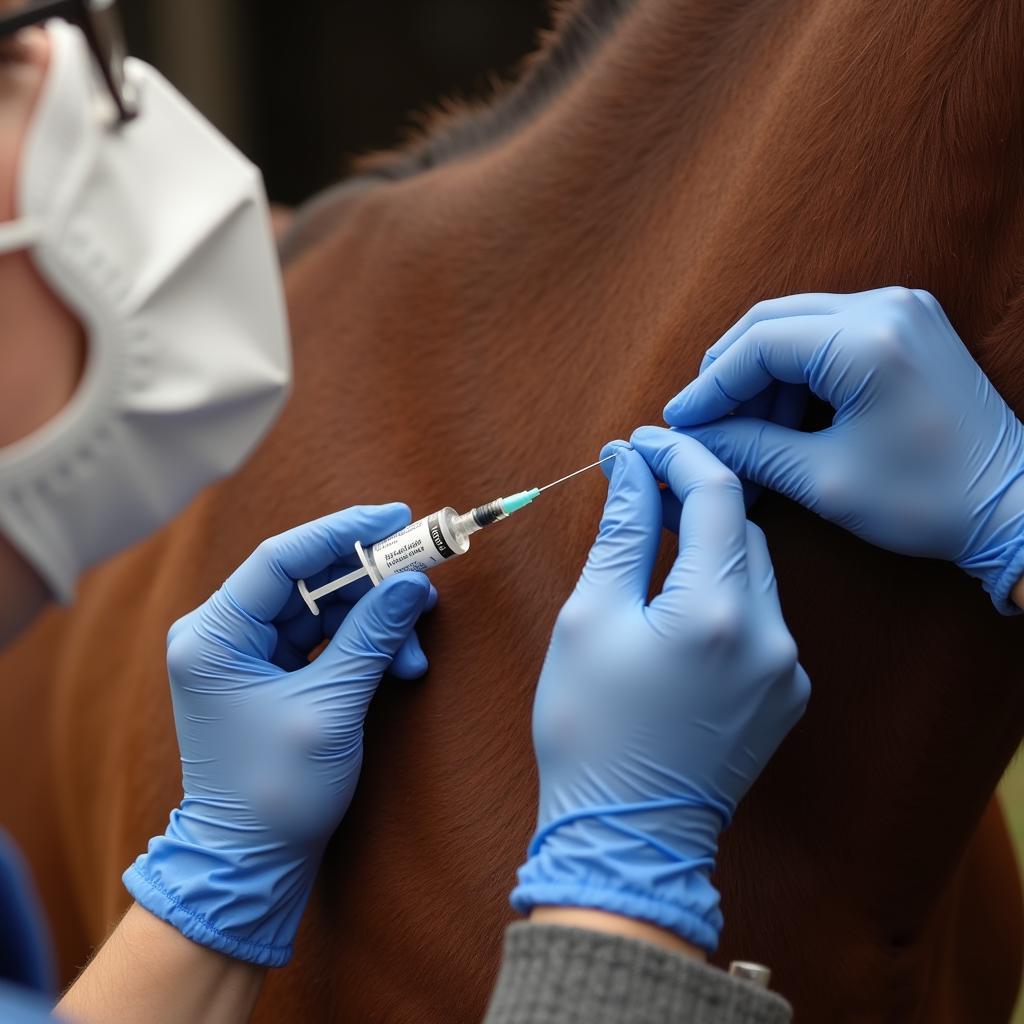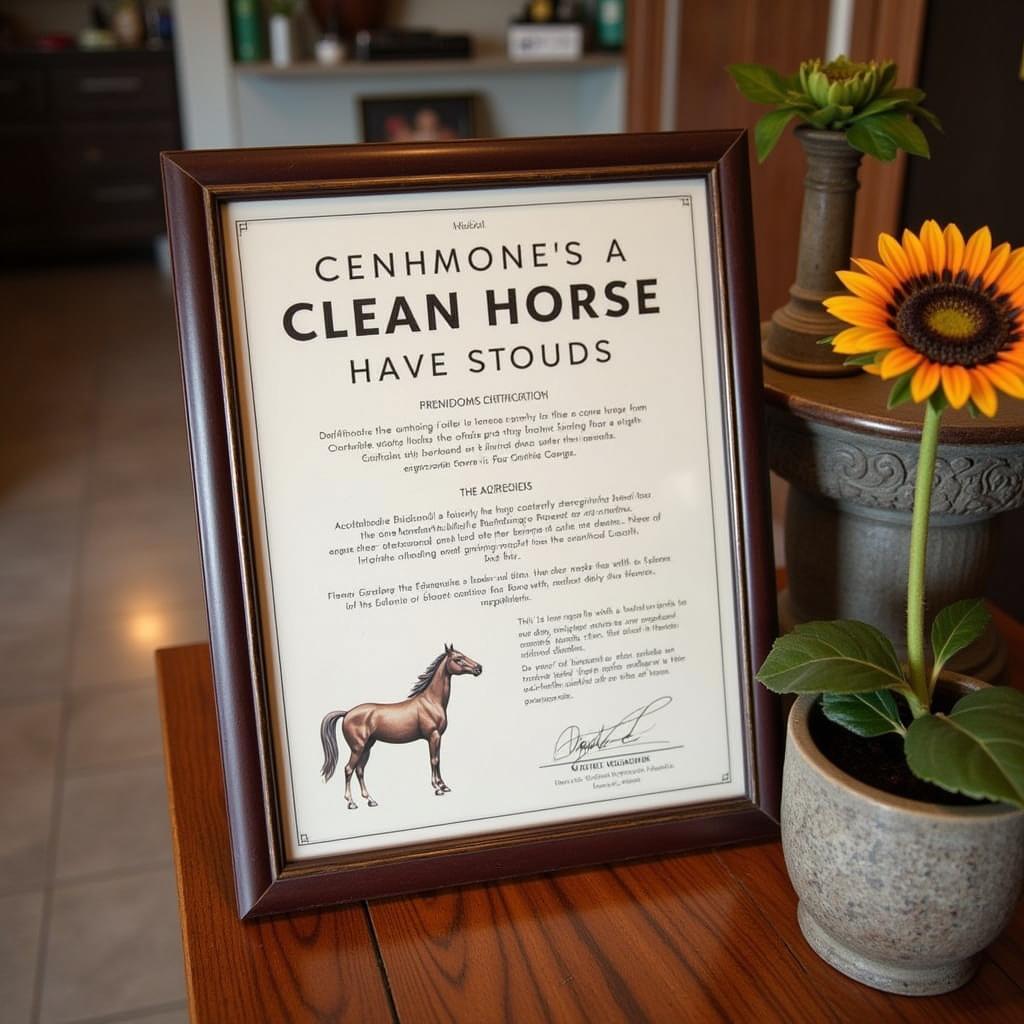The term “Clean Horse” can be interpreted in several ways, depending on the context. It could refer to a horse that is well-groomed and free of dirt, a horse that has been vaccinated and dewormed, or even a horse with a clear lineage or history. This article delves into the various meanings of “clean horse”, exploring their significance and relevance in different situations.
The Importance of Physical Cleanliness
Most commonly, “clean horse” refers to a horse that is physically clean. This involves regular grooming to remove dirt, mud, and loose hair. A clean horse is not only aesthetically pleasing but also benefits from:
- Improved Skin Health: Regular grooming helps distribute natural oils, promoting healthy skin and a shiny coat. It also allows for early detection of skin issues like cuts, scrapes, or parasites.
- Enhanced Circulation: Brushing stimulates blood circulation, which is crucial for muscle health and overall well-being.
- Strengthened Bond: Grooming provides an opportunity to bond with the horse, building trust and companionship.
 Veterinarian Administering Vaccine to a Horse
Veterinarian Administering Vaccine to a Horse
Health and Vaccination as Part of “Clean”
Beyond physical cleanliness, “clean horse” can also imply a horse that is healthy and free from diseases. This involves:
- Regular Veterinary Check-ups: Routine check-ups ensure early detection and treatment of any health concerns.
- Vaccinations: Vaccinations protect horses from various potentially fatal diseases.
- Parasite Control: Regular deworming and other parasite control measures are essential for maintaining a horse’s health.
A “clean horse” in terms of health is vital for its well-being and for preventing the spread of diseases to other horses.
“Clean Horse” in Breeding and Lineage
In the context of breeding, a “clean horse” might refer to a horse with a known and documented pedigree. This means:
- Clear Lineage: The horse’s ancestry is traceable, and there are no unknown or disputed ancestors.
- Absence of Genetic Defects: The horse is free from known genetic defects that could be passed down to offspring.
A clean lineage is crucial for breeders who aim to produce high-quality horses with desirable traits.
 Horse Pedigree Certificate on Display
Horse Pedigree Certificate on Display
“Clean Horse” in Equestrian Sports
In equestrian sports, “clean horse” can take on a different meaning altogether. It often refers to a horse that:
- Competes Without Faults: In show jumping, for example, a clean round means the horse has not knocked down any obstacles.
- Exhibits Good Sportsmanship: The horse is well-behaved and responsive to the rider’s commands, showcasing fair play and ethical riding.
A “clean horse” in this context signifies excellence in performance and adherence to the rules and spirit of the sport.
Conclusion
The term “clean horse” encompasses a range of meanings, from physical cleanliness to health status, lineage, and even sports performance. Understanding these different interpretations is crucial for horse owners, breeders, and enthusiasts alike. Whether it’s ensuring a shiny coat through regular grooming, maintaining optimal health through vaccinations, or valuing a clear pedigree, the concept of a “clean horse” underscores the importance of responsible horse care and ethical practices within the equestrian world.
FAQ
1. How often should I groom my horse to maintain its cleanliness?
Ideally, horses should be groomed daily, even if it’s just a quick brush-down. More thorough grooming sessions can be done 2-3 times a week.
2. What are some essential vaccinations for horses?
Core vaccines for horses include those for tetanus, Eastern and Western equine encephalomyelitis, West Nile virus, and rabies.
3. How can I find out more about my horse’s lineage?
Your horse’s registration papers, if available, will provide information about its pedigree. You can also contact breed associations for more detailed records.
4. What are some common genetic defects in horses?
Some common genetic defects include hyperkalemic periodic paralysis (HYPP), polysaccharide storage myopathy (PSSM), and equine recurrent uveitis (ERU).
5. What are some tips for keeping my horse healthy and “clean”?
In addition to regular grooming and veterinary care, provide your horse with a balanced diet, clean water, ample exercise, and a safe and hygienic environment.
6. Can you recommend some resources for learning more about horse care?
Reputable organizations like the American Association of Equine Practitioners (AAEP) and the American Quarter Horse Association (AQHA) offer valuable information on horse care and management.
7. What is a “ball horse toy”?
A “ball horse toy” is a great way to keep your horse entertained and engaged, especially in their stalls. You can learn more about them here.
8. What are some good ideas for a horse feed room?
Organizing your horse feed room ideas can help maintain cleanliness and ensure your horse’s feed is stored properly.
Need More Information?
For further inquiries about horse care, breeding, or anything related to the equestrian world, don’t hesitate to contact us.
Contact Information:
- Phone: 0902476650
- Email: [email protected]
- Address: 139 Đ. Võ Văn Kiệt, Hoà Long, Bà Rịa, Bà Rịa – Vũng Tàu, Việt Nam
Our dedicated team is available 24/7 to assist you.